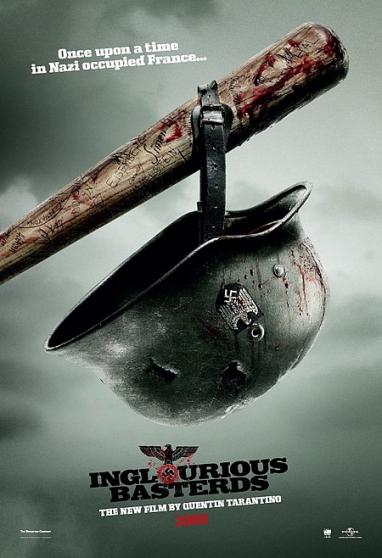Box Office Review: Inglourious Basterds [2009]
Running Time: 2 hrs. 32 min.
Release Date: August 21st, 2009 (wide)
MPAA Rating: R for strong graphic violence, language and brief sexuality.
Distributors: The Weinstein Company
Brad Pitt
Christolph Waltz
Mélanie Laurent
Diane Kruger
Eli Roth
Brad Pitt is hilarious but it is the (likely Oscar nominated) acting of lesser known Christolph Waltz that steals the show. Waltz plays Nazi Colonel Hans Landa– an evil but well-mannered hunter of Jews who somehow, against the horrors, comes off as a character you enjoy “watching” throughout the film. This is no small feat, and no small testament to a film about comeuppance (in Dirty Dozen fashion, or even Hogan’s Heroes if it were re-done on HBO) that never really succumbs to the oft heavy-handedness of revisionist war films.
It would seem that Quentin Tarantino has become, finally, an auteur. Now you might argue that Tarantino has been an auteur from the get go. Or you might argue that he was certainly an auteur the moment we saw Pulp Fiction. But, in my book, and perhaps in the minds of many of us who are post-Sarris believers in auteur theory, a director need sustain a measured ouevre. In plain English: a director needs great films, over time, that are singularly his/hers.
No one would argue that a Tarantino film always feels like a Tarantino film, and Inglourious Basterds is no different. There are even moments you might believe a scene should/ might have gone a different way, save for the need of Tarantino’s “violent stamp.” For me such moment occurs when the film could choose to expand upon the impossible relationship, painstakingly set-up, between a Jewish cinema owner and a Nazi hero, but instead chooses to have this “couple” blow each other away– with trademark Tarantino violence stamped all over her. For those of us who subscribe to auteur theory, that scene actually needed to be filmed in exactly that manner.
And you will get no argument here that Pulp Fiction was a truly remarkable film. It is a “teaching” film, and will remain a classic for decades to come. But it is with Inglourious Basterds, some fifteen years on, that I now feel comfortable proclaiming Tarantino an Auteur. Inglourious Basterds is a Tarantino film, and yet it also exhibits the fact that Tarantino is continuing to grow as a director. His ability to blend comic elements with the disturbingly serious may– and I know this sounds like sacrilege– one day be superior to Hitchcock’s.
Therein lies the one problem with Tarantino– he works quite infrequently. And that is either his method, and necessary, or it is an infernal shame. Because when you watch Inglourious Basterds you begin to realize that Tarantino has made a war film here, and you salivate at the thought of him orchestrating a Schindler’s List or a Saving Private Ryan. Tarantino has made a dark serio-comedy here, and you wonder what he could do with a few more Fargo’s and Down By Law’s. Tarantino has made a charming love story here where the lovers can’t possibly find love, and a fantasy story wherein Hitler is killed for his sins, and so on and so on. You almost get the feeling he could have made five different, very good movies here– which begs the question: How did he pull off this cornucopia of a film? I won’t give it away here (except the Hitler part, which oddly enough has little to do with the emphasis of this film–only its marketing). What I will say is go and see this one. If you love Tarantino, I’m betting you love him more now. If you do not “get” Tarantino, watch this film with a clean slate: Isn’t it amazing where Tarantino may now be going?
My hope? Back in the directing chair. Soon. And often.
Bottom Line: 4.5/5.0



Leave a Reply